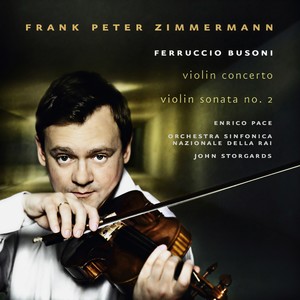
Busoni: Violin Concerto & Violin Sonata No. 2
- 演奏: Frank Peter Zimmermann (弗兰克·彼得·齐默尔曼) (小提琴)/ John Storgards (小提琴)/ Enrico Pace (恩里科·培斯) (钢琴)
- 乐团: Orchestra Sinfonica Nazionale della Rai
- 发行时间:2005-07-18
- 唱片公司:索尼音乐
- 类型:录音室专辑
- 歌曲
- 时长
-
作曲家:Ferruccio Busoni( 费卢西奥·布索尼)
-
作品集:Violin Concerto in D Major, BV 243, Op. 35a
-
作品集:Violin Sonata No. 2 in E Minor, BV 244, Op. 36a
简介
Violin: Frank Peter Zimmermann Orchestra: Orchestra Sinfonica Nazionale Della Rai Conductor: John Storgards Piano: Enrico Pace SELF-CRITICISM is considered an artistic virtue, but Ferruccio Busoni some¬times made too much of a good thing. After publishing his visionary "essay at a new aesthetics of composition" in 1907, he approached his earlier works with an undue degree of scepticism. It was necessary for friends and exponents of his earlier works to advocate the virtues of those pieces with him. One of these advocates was the violinist Josef Szigeti, who first met Busoni about 1912, and spoke up for the composer's Violin Concerto. Szigeti was right: indeed, the con¬certo had done much at its Berlin premiere of 1897 to establish Busoni's repu¬tation as a composer. All the same, it was only after he had played the work through with Szigeti that Busoni, with a "half conciliatory, half proud smile", was prompted to confess: "Well yes, I must admit, it is a good work - if unpre¬tentious". Formally, in fact, the concerto does appear altogether relaxed in natu¬re, but it may be its very character of rhapsodic freedom that lifts it above the ordinary: it engenders its tension with a mere structural skeleton of motivic and thematic repetitions. While the audience applauded after the premiere for the repeat of the last movement (which reminded Busoni, in his own words, of a carnival), Busoni's friend and piano pupil Sibelius also spoke frankly of the wor¬k's beauty. Quite unapologetically, he took over into his own Violin Concerto details such as the dialogue between violin and bassoon in Busoni's first move¬ment. And Busoni himself was to pursue the highly individual fusion of soloistic virtuosity, sensual melody and lucid instrumentation, which he successfully achieved here, in the interests of his later ideal of a "rejuvenated Classicism". It was the Violin Sonata op. 36a of 1900, however, to which Busoni assigned a key position among his early works. This piece, he claimed, had enabled him to find his own path as a composer; among friends, therefore, he dubbed it his "opus one". The chorale-like motto presented by the solo piano at the commen¬cement of the sonata is in fact a distinguishing mark of the later Busoni. The sequence of movements with their alternating characters proves Busoni, despi¬te the evidence of his Violin Concerto, to be a "worshipper of form"; he is clear¬ly influenced by Beethoven's Piano Sonata op. 109. Nor can the closing variati¬ons on Bach's chorale tune "Wie wohl ist mir, o Freund der Seele" be seen as any¬thing but an act of homage to form and model. At the same time, they are a moving epitaph to an unknown colleague. Ottokar Novacek, the dedicatee of the sonata, died before the work appeared in print; Busoni had valued him not only as a friend, but also - despite his modest success to date - as a composer. Carsten Niemann (Translation: Janet and Michael Berridge) Frank Peter Zimmermann began playing the violin at the age of 5 and figured in his first concert with orchestra at the age of 10. Following his studies with Valéry Gradow, Saschko Cawriloff and Hermann Krebbers, his pre¬stigious ascent took off in 1983, bringing him into the company of the world elite. He has received many distinctions, among them the Premio del Accademia Musicale Chigiana (1990), the Rhein/scher/Musikpreis (1994) and the musical award 0/ the city 0/ Duisburg (2002). Frank Peter Zimmermann plays at all important festivals and with all famous orchestras and conductors throughout the old and new worlds. Parallel to his many orchestral commitments, Frank Peter Zimmermann can be heard regular¬ly in chamber music concerts in the big national and international arenas of the world. The interpretations of his classical, romantic and 20th century repertoire never fail to find acclaim with press and public alike. Since 1998 he has been permanently accompanied by the young Italian pianist Enrico Pace in his ren¬dering of chamber music. Furthermore, Frank Peter Zimmermann is regularly involved in concerts with Heinrich Schiff and Christian Zacharias. Frank Peter Zimmermann plays a Stradivari from the year 1711 that once belon¬ged to the outstanding violinist Fritz Kreisler. Mr. Zimmermann was provided with the instrument thanks to the courtesy of WestLB.

